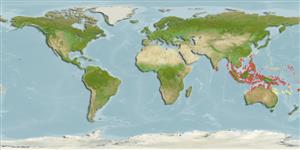Common names from other countries
>
Kurtiformes (Nurseryfishes, cardinalfishes.) >
Apogonidae (Cardinalfishes) > Apogoninae
Etymology: Taeniamia: Name from feminine Latin noun 'taenia' meaning ribbon or band; and feminine Greek noun 'Amia' meaning a fish, often used with cardinalfishes genera. Here as Taeniamia referring to the vertical wide bars and near vertical to curved narrow bars as lines on most of the species in this genus..
More on author: Bleeker.
Environment: milieu / climate zone / depth range / distribution range
Ecologia
marino; salmastro associati a barriera corallina; distribuzione batimetrica 0 - 6 m (Ref. 54391), usually 0 - 3 m (Ref. 90102). Tropical
Western Central Pacific: Indonesia to Fiji, north to Taiwan.
Size / Peso / Age
Maturity: Lm ? range ? - ? cm
Max length : 7.5 cm SL maschio/sesso non determinato; (Ref. 37816)
Spine dorsali (totale): 8; Raggi dorsali molli (totale): 9; Spine anali 2; Raggi anali molli: 12 - 14. Diagnosis: Dorsal rays VII,9; anal rays 11,12-13 (rarely 14); pectoral rays 14 (rarely 13 or 15). Two lateral-lines, scales 25 + 3-5; median predorsal scales 1-2 (rarely 3 or 4; more anterior predorsal scales in pairs). Gill rakers 5-7-+ 15-17 (total, 21-23). Body depth ~.6-2.9 in SL, and body width 2.0-2.3 in the depth; eye diameter 3.0-3.6 in head length; first dorsal spine 1.5-1.9 in second spine; second and third dorsal spine 2.4-3.0 in HL; spine of second dorsal fin 2.4-2.9, and second anal spine 3.0-3.7 in HL; pelvic-fin length 4.4-5.1, and caudal-peduncle length 4.2-4.65 in SL; distance from insertion of pelvic spine to anal-fin origin 3.8-4.4 in SL. Posterior and ventral preopercular edges fully serrate or nearly so. Scaly sheath along anal-fin base poorly developed or absent (Ref. 54391).
Occurs near river mouths and estuaries (Ref. 54391), on shallow inner reefs and mangroves (Ref. 37816), over soft or hard bottoms (Ref. 54391). Forms aggregations (Ref 90102).
Life cycle and mating behavior
Maturità | Riproduzione | Deposizione | Uova | Fecundity | Larve
Are mouthbrooders (Ref. 240). Distinct pairing during courtship and spawning (Ref. 205).
Gon, O. and J.E. Randall, 2003. Revision of the Indo-Pacific cardinalfish genus Archamia (Perciformes: Apogonidae), with description of a new species. Indo-Pac. Fish. (35):49 p. (Ref. 54391)
IUCN Red List Status (Ref. 130435)
CITES (Ref. 128078)
Not Evaluated
Threat to humans
Harmless
Human uses
Informazioni ulteriori
BibliografiaAcquacolturaProfilo di acquacolturaVarietàGeneticaElectrophoresesEreditarietàMalattieElaborazioneMass conversion
CollaboratoriImmaginiStamps, Coins Misc.SuoniCiguateraVelocitàModalità di nuotoArea branchialeOtolithsCervelliVista
Strumenti
Special reports
Download XML
Fonti Internet
Estimates based on models
Preferred temperature (Ref.
115969): 26.6 - 29.3, mean 28.6 (based on 1549 cells).
Phylogenetic diversity index (Ref.
82804): PD
50 = 0.5001 [Uniqueness, from 0.5 = low to 2.0 = high].
Bayesian length-weight: a=0.01122 (0.00528 - 0.02384), b=3.10 (2.92 - 3.28), in cm Total Length, based on LWR estimates for this (Sub)family-body shape (Ref.
93245).
Trophic level (Ref.
69278): 3.5 ±0.5 se; based on size and trophs of closest relatives
Resilienza (Ref.
120179): Alto, tempo minimo di raddoppiamento della popolazione meno di 15 mesi (Preliminary K or Fecundity.).
Fishing Vulnerability (Ref.
59153): Low vulnerability (10 of 100).
